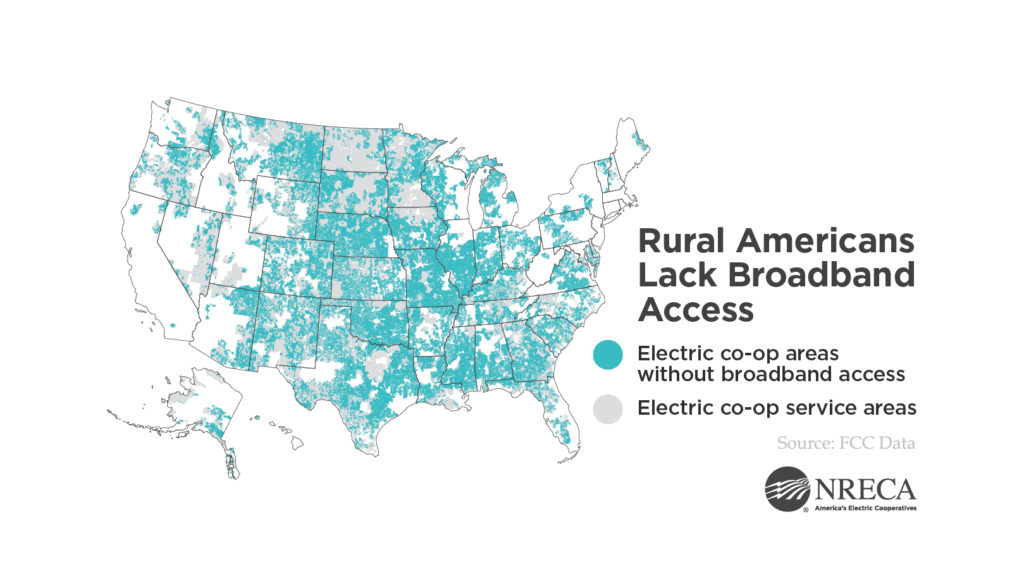
A new NRECA study finds that approximately $70 billion in consumer value will be lost over 20 years if broadband internet access remains elusive for millions of electric cooperative members in rural America.
“High-speed broadband is essential infrastructure for modern life. Unfortunately, broadband access and adoption are not ubiquitous,” said Russell Tucker, NRECA chief economist and lead author of Unlocking the Value of Broadband for Co-op Consumer Members.
“The digital divide is real, and many Americans remain without adequate broadband service,” said Tucker.
For purposes of the study released Sept. 11, broadband or high-speed internet access is defined by the Federal Communications Commission as 25 megabits per second download and 3 megabits per second upload.
Here are some key takeaways from the study:
1. Millions of Co-op Members Lack Broadband
About 34 million Americans are without access to 25 Mbps/3 Mbps internet service, according to the FCC. Of that number, at least 13.4 million people in 6.3 million electric co-op households across the country lack broadband access.
Within every state served by electric co-ops, there are areas without high-speed internet service. This underscores how deficient broadband access is a multistate issue.
2. Private Carriers Fear Rural Costs
When it comes to connecting rural Americans to the internet, there is a huge gap between the benefits to consumers and what a private service provider will earn by deploying broadband in areas with low population density. Many of these areas are electric co-op territories.
Private carriers often find their returns fail to justify their per-customer investment cost even when the lost value for these rural consumers could exceed deployment costs by 70 percent.
3. Billions of Dollars Left on the Table
The FCC estimates that nearly all of the areas in the U.S. without broadband could be connected with an initial capital expenditure of $40 billion. In comparison, NRECA estimates that the lost consumer value of not connecting electric co-op members with broadband is $68 billion over a 20-year period.
A recent study by the Purdue Center for Regional Development calculated that the state of Indiana would receive about $12 billion in net benefits if the broadband investment were made in co-op territories statewide.
4. Broadband Backbone Eases Co-op Entry
A modern electric co-op requires up-to-the-minute smart communications technology, and that requires a broadband backbone. Such a system would allow the co-op to communicate with its substations, better oversee powerlines to restore or even prevent outages in a timely fashion, and provide smart meters and other advances that consumers demand.
A broadband backbone also affords co-ops the opportunity to provide retail high-speed internet, when possible, as it passes fiber-optic cable by members’ homes and businesses. Thus, co-ops that build a broadband backbone for their electric power system can more economically connect rural areas.
5. A Good Partner Can Help
Many hands lighten the load, and that rings true for rural broadband. While electric co-ops may have infrastructure in place and brand recognition among consumers in rural areas they serve, the cost to deliver high-speed internet can give many pause.
Government loans and loan guarantees and grants for rural broadband can help close the digital divide and narrow the gap between investments and lost consumer value. Partnerships between co-ops and private carriers are an economical way to deliver internet service to members at the end of the line.
NRECA, NRTC and Ericsson partnered on “The Value of a Broadband Backbone for America’s Electric Cooperatives: A Benefit Assessment Study,” available on cooperative.com. Also check out several co-op broadband case studies.
Cathy Cash is a staff writer at NRECA.
